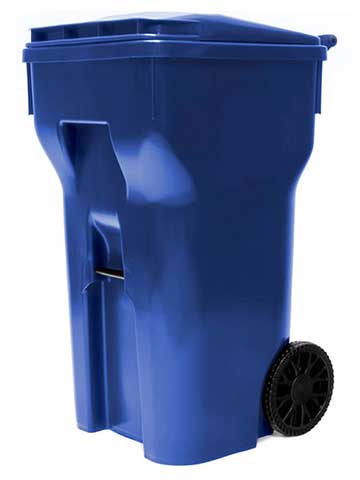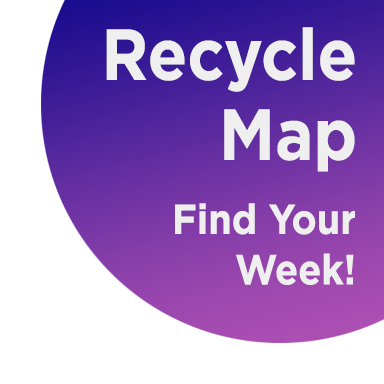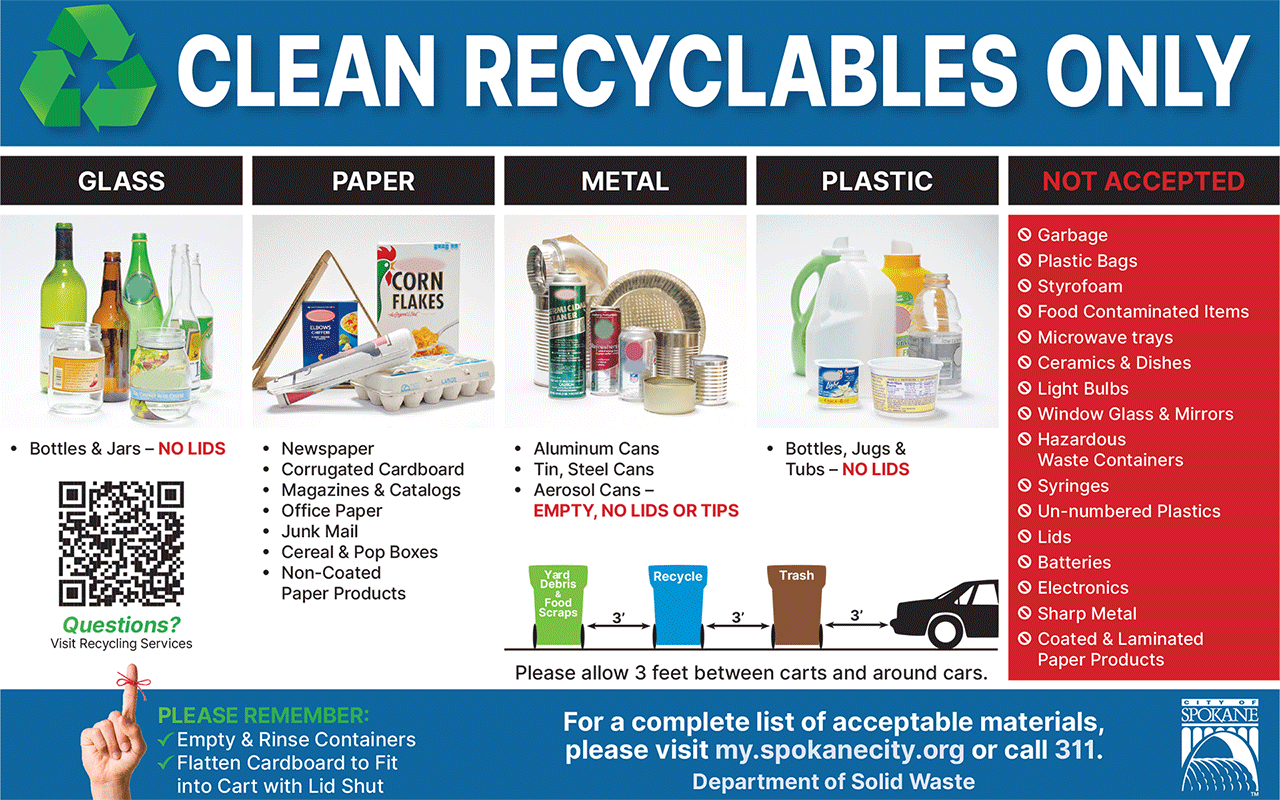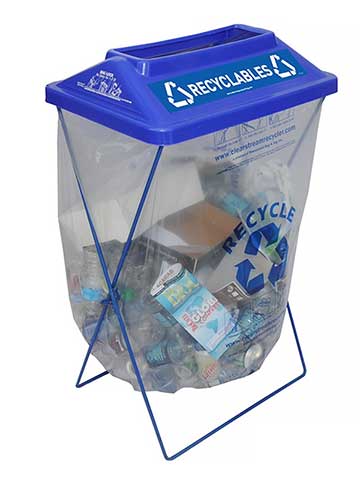Recycling Services
- Curbside Recycling
- SMaRT Center
- Cart Tagging
- Dropoff Recycling
- Household Hazardous Waste
- Special Items
- Waste Directory
- Special Event Recycling
Curbside Recycling

Spokane uses a single stream recycling system, allowing for convenient, efficient services.
Recyclables are taken to the Spokane Materials and Recycling Technology (SMaRT) Center owned and operated by, Waste Management, where they are sorted, processed and prepared for markets. Here are some commonly asked questions about recycling plastics.
Find your recycling collection week and more information on the Recycling Map page.
Recycle Right!
- Materials should be loose, clean, and dry. Do not place bagged or boxed items in the cart.
- Place your carts at the curb by 6 a.m. with lids open toward the street or alley.
- Carts should be placed a minimum of 3 ft. from other collection carts or objects.
- Avoid overloading the cart (200-pound weight limit).
- Materials should not extend outside of the cart. Extra material can be bundled and placed next to the cart (must be less than 4 ft. in height). Additional fees apply.
Moving?
Neatly stack broken down moving boxes and packing paper, up to one (1) yard, next to your recycling cart and your recycling driver will pick up extras that will not fit in your recycling cart as a one-time courtesy pick-up* on your next collection day. Foam peanuts, bubble wrap or any other types of non-recyclable packing material will not be accepted as recycling. Non-recyclable materials next to or mixed in with your cardboard will either be left or picked up as garbage and charged accordingly.
*Service available for single-family residential customers only. Not available for commercial or multi-family properties.
For information about missed collection, vacation hold, and assistance for elderly or disabled customers, please visit the Solid Waste Residential Services page.
Free Recycling Drop-off Locations
Spokane County residents have three options to self-haul and drop off clean recyclables free of charge:
- Waste to Energy Facility Recycling & Disposal Site, 2900 S. Geiger Blvd.
Hours: 7:30 a.m. – 5 p.m., 7 days a week - Spokane County - North County Recycling & Transfer Station, 22123 N. Elk-Chattaroy Road
View Hours of Operation - Spokane County - Valley Recycling & Transfer Station, 3941 N. Sullivan Road
View Hours of Operation
For disposal locations and hours, please see our Disposal Locations page.
Household Hazardous Waste
For information about Household hazardous waste, please see our Hazardous Wastes page.
Special Items and Waste Directory
Appliances
Residential appliances are accepted and recycled, but require a regular waste charge (same as garbage) because of special handling. Refrigerators with ammonia are not accepted at the Transfer Stations, however, they are accepted at the Waste to Energy Facility at the regular garbage rate. Commercial sized refrigerators or freezers are not accepted.
Light Recycling
Recycling of mercury-containing lights is now free in Washington state at authorized collection sites (including SCRSWS transfer stations), thanks to the Washington Mercury-Containing Lights Stewardship Program and LightRecycle Washington.
Batteries
Household Batteries can be collected in a clear plastic bag and placed on top of the Single Stream Recycling Cart lid. Otherwise, you can drop them off at the HHW collection area at your local transfer station.
Lithium-ion batteries pose risk of fire and should not be placed in recycling or trash containers. Visit Battery Smart Spokane to learn more about safe battery handling and disposal.
Electronics
E-cycling is the reuse and recycling of electronic products. Unwanted electronic equipment is one of the fastest growing segments of the solid waste stream, and can contain materials that are harmful to our environment. Fortunately, many of these items, such as computers, TVs, VCRs, stereos, copiers, fax machines, and cell phones, can be reused or recycled.
Washington has a free, convenient and environmentally responsible recycling program for many of these items. Visit the E-Cycle Washington website or call 1.800.RECYCLE (732.9253) to find e-cycling opportunities near you. Below are partial lists of Spokane County locations that can take your unwanted electronics.
Computers and Peripherals
- Best Buy: 9970 N. Newport HWY, 509-467-9656 and 18223 E. Indiana Ave., 509-924-4361 https://www.bestbuy.com/site/clp/recycling/pcmcat149900050025.c?id=pcmcat149900050025
- Earthworks Recycling: 1904 E. Broadway Ave. 509.534.1638 www.earthworksrecycling.com
- Inland ReTech: 7203 E. Nora Ave. 509.326.1165 www.inlandretech.com
- Recycle Techs: 6810 E Appleway Blvd 509.926.1605 www.recycletechs.com
- Goodwill Industries: [multiple locations] 509.838.4246 www.discovergoodwill.org
- Salvation Army: 204 E. Indiana Ave. 509.325.6810 www.salvationarmyusa.org
Toner/Printer Cartridges
- Cartridge World (Spokane): 509.927.1077, 509.465.8900, or 509.489.3000
- Earthworks Recycling (Spokane): 509.534.1638 www.earthworksrecycling.com
- Inland ReTech (Spokane): 509.326.1165 www.inlandretech.com
- Kershaw's Inc. (Spokane): 509.456.6500
- MCPC (Spokane): 509.624.9101
- Office Depot (Spokane): 509.536.7600
- Staples (Spokane): 509.328.6495, 509.466.8989, or 509.927.8291
Always call first to verify items accepted and whether there is a fee.
Cell Phones
Most major cell phone retailers will take any used cell phone, whether or not it came from them and whether or not you buy a new one from them. Remember to cancel your cell phone service and delete any stored information before recycling or donating the phone. The following companies accept cell phones. Always call first.
- Earthworks Recycling: 1904 E. Broadway Ave. 509.534.1638 www.earthworksrecycling.com
- Inland ReTech: 7203 E. Nora Ave. 509.326.1165 www.inlandretech.com
- Recycle Techs: 6810 E Appleway Blvd 509.926.1605 www.recycletechs.com
- Spokane Recycling: 3407 E. Main Ave. 509.535.0284 www.spokanerecycling.com
Or, consider donating your old cell phones to:
- Hope Line: Drop boxes at all Verizon stores and Spokane Teachers Credit Union branches.
- Spokane County Domestic Violence Consortium: 509.835.4500
- Spokane Neighborhood Action Programs (SNAP): 509.456.7111, Ext. 242
- YWCA Alternatives to Domestic Violence: 509.326.1190
Textiles/Household Items
You can take clothing and bedding in good condition to Goodwill, a thrift or consignment store, or sell/donate items on Craigslist, Facebook Marketplace, etc.
Construction Materials
- Habitat for Humanity: 1805 E. Trent habitat-spokane.org/habitat-store
- Overstock Builder’s Surplus: 2516 E. Sprague Ave. 509.475.2792
- RECLAIM REBUILD Innovation Center: 16816 E. Sprague Ave. (Fiddy Club Drop-off Area) 509.435.6708
Always contact first to verify items accepted.
Other Items/Waste Directory
Please check the Check the Spokane Waste Directory.
Solid Waste Collection Calendar

View Full Calendar (PDF 585 KB)
Event Recycling
Organizations may borrow waste collection equipment and materials from the Waste Reduction Lending Library.



